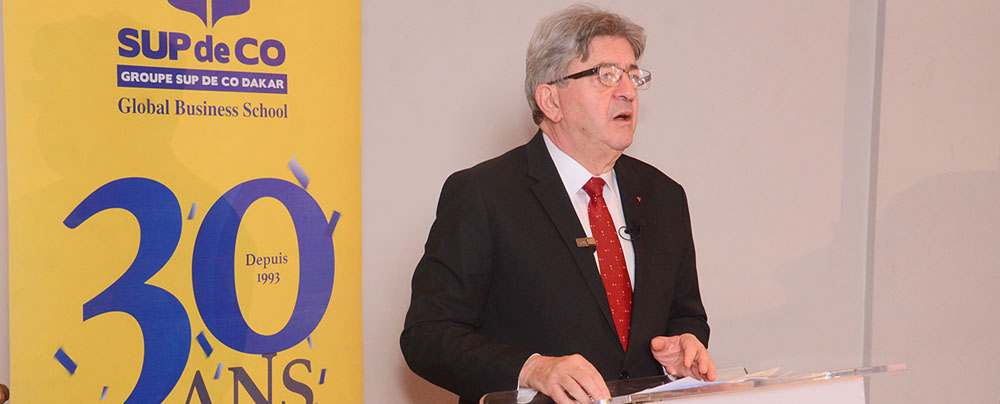As part of our series of conferences “Les Fridredis de Supdeco”, we had the honour to welcome Mr. Jean-Luc Mélenchon, an eminent French politician, former Minister and Co-President of the Institut La Boétie for a conference on “Geopolitical Instabilities in the World: Direct Short and Medium Term Consequences for Africa”.
The Fridays of Supdeco
Led by renowned experts, these meetings address a wide range of topical issues, thus fostering intellectual reflection on the crucial issues of economic and social development.
The diversity of the topics covered and the calibre of the speakers make the “Supdeco Fridays” a real crossroads of ideas and a leading intellectual research workshop.
A Prestigious Audience
The event brought together a prestigious and diverse audience, including ambassadors (Morocco, Egypt, DRC, Guinea Bissau, Algeria…), representatives of ministries, MPs, students, professionals and senior executives. This varied participation attests to the importance and relevance of the topics discussed at this conference.
Presentation by Jean-Luc Mélenchon
Jean-Luc Mélenchon began his presentation by highlighting current geopolitical dynamics and their impact on the African continent. He stressed the strategic importance of Africa because of its natural resources and geographical position, making it a central region in global geopolitical issues.
Analysis of Geopolitical Instabilities
Jean-Luc Mélenchon identified several sources of geopolitical instability, each with specific repercussions for Africa. The proliferation of conflicts, which may lead to an increase in military spending, to the detriment of investment in economic and social development. In addition, regional tensions can exacerbate internal divisions, weaken governments and make governance processes even more complex.
Climate change had devastating effects on natural resources and led to forced migration. These phenomena disrupt local economies, particularly in agriculture and fisheries, and exacerbate conflicts over access to resources.
Global economic fluctuations and the rise of protectionist policies affect trade and make African economies more vulnerable to external shocks.
Technological advances and cyber threats pose new security and development challenges. While new technologies offer opportunities for growth and innovation, they can also be exploited for malicious purposes, endangering critical infrastructure and data security.
Call to Action
To face these challenges, Mélenchon stressed the need for enhanced cooperation between African nations and their international partners. He stressed the importance of inclusive governance and sustainable development, while highlighting investment in education and infrastructure to strengthen the resilience of African societies to external shocks.
Exchanges and Discussions
The conference ended with a dynamic Q&A session between Mélenchon and our many students. Discussions covered a variety of topics, including migration policies, reform of international institutions and the role of new technologies in Africa’s economic development.
The conference provided an enriching platform for understanding current geopolitical challenges and their impact on Africa. The Supdeco Dakar Group remains committed to promoting high-level discussions to inform development paths in Africa.
We thank all participants for their presence and contribution to this fruitful exchange. We look forward to the upcoming Supdeco Fridays to continue exploring and debating the critical issues of our time.


